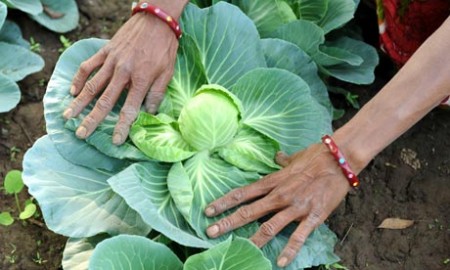India going organic
Millions of farmers in dozens of states in India follow the footsteps of Sikkim in their effort to adopt ways of agriculture that are more friendly to human health and ecology.
Sikkim story
When in 2003 a north-east Indian state Sikkim decided to go organic, few believed it will be the story of inspiration for farmers in India who were increasingly becoming dependent on chemical fertilisers.
Last month, Sikkim’s Agriculture Minister Vishal Chouhan announced that his state will turn fully organic and eco friendly by 2015. The state has covered over 8000 hectares of land for organic farming as of 2009. The state had lifted all subsidies on chemical fertiliser by 2007 and promoted use of bio-fertiliser.
The state has become example for millions of farmers across India, who are gradually turning to hear what Sikkim is saying. And Sikkim is walking head-high to demonstrate India does not needs chemicals to meet its food demand.

There are many states to follow the footsteps of Sikkim. Last week, Kerala government launched pilot project on organic farming and announced ban on sale of GM seeds and endosulfan in the state. Kerala has taken technical assistance of Sikkim Organic Mission to run the project.
According to Times of India report, around 500 people lost their lives due to excessive use of the pesticide in the cashew plantations in Kasaragod district of the state in the past 20 years.
Madhya Pradesh, Orissa, Haryana, Punjab, Andra Pradesh, Maharastra, Rajesthan, Himanchal Pradesh and several other states are taking serious steps towards promoting organic farming. The first organic food testing laboratory of Punjab, coming up in Jalandhar with support from central government, will be one of many agricultural labs in India to certify the farmers’ produce before it is sold in the open market.
Impact on health
The seriousness has come following the reports of deteriorating health conditions of the people where chemical farming is increasingly practiced and cases of prolonged droughts in recent years.
Many states have experienced drought, sharp decline in agriculture production, increasing evidences of pests becoming resistant to pesticides and bad affect in the human health due to excessive use of chemical fertiliser. A train in Punjab is named ‘Cancer Express’ because it carries only cancer patient travelling to Rajesthan seeking medical treatment. Reports say, it was result of the excessive use of chemical fertiliser. A 2005 report by Center for Science and Environment in the state mentioned presence of pesticide in human blood sample. Today, the state consumes highest volume (19 per cent of total national consumption) of pesticide in India.
Called the ‘food bowl’ of the country at the height of ‘Green Revolution’ success in 1960s and 70s, Punjab is now looking for measures to adopt more humane and eco-friendly way of agriculture. Ironically, the green revolution, created through the excessive use of chemical fertiliser, has pushed state for ‘drought revolution’ today.
Market
Initially, farmers were reluctant towards organic farming saying it is expensive and fewer consumers are interested to buy the products. Things have changed. Aggressive public campaigns have given yields – market for organic agricultural products in India and across the globe has grown faster than expected.
Press Trust of India (PTI) reported a 20-22 per cent market growth of the organic agriculture products.
A new report entitled ‘Indian Organic Foods Market’ released by Yes Bank said the global organic food and beverages market is expected to grow from US$57.2 billion in 2010 to US$104.5 billion by 2015 with a compounded annual growth rate (CAGR) of 12.8 per cent.
The report mentioned, Europe contributed to the largest share of the organic foods market in 2010 with revenue of US$27.8 billion while Asia-Pacific organic food market generated a total revenue of US$3.5 billion in 2010 at CAGR of 16.2 per cent between 2006-2010. India’s market for organic food including exports is estimated to be around US$190 billion.
The market growth has encouraged more farmers to go organic in India. According to Indian government data, area under organic farming had risen to 1.08 million hectare.
A PTI report said, India is the largest organic cotton grower in world, and accounts for 50 per cent share of total world organic cotton production.
Slow but steady
Turning to organic is not overnight. “Organic farming has a slow start; the land takes at least three years to be able to produce a huge yield, but once it is converted, the produce is abundant and the soil becomes healthy too. Apart from that, organic pesticides are very cheap and don’t reduce the quality of the produce,” Deccan Chronicle quoted Abhinav Gangumalla of Hyderabad Goes Green (HGG).
Growth is slow but steady. Sikkim-inspired initiative is likely to make India more greener and eco-friendly, if no hurdles are experienced in the mission.